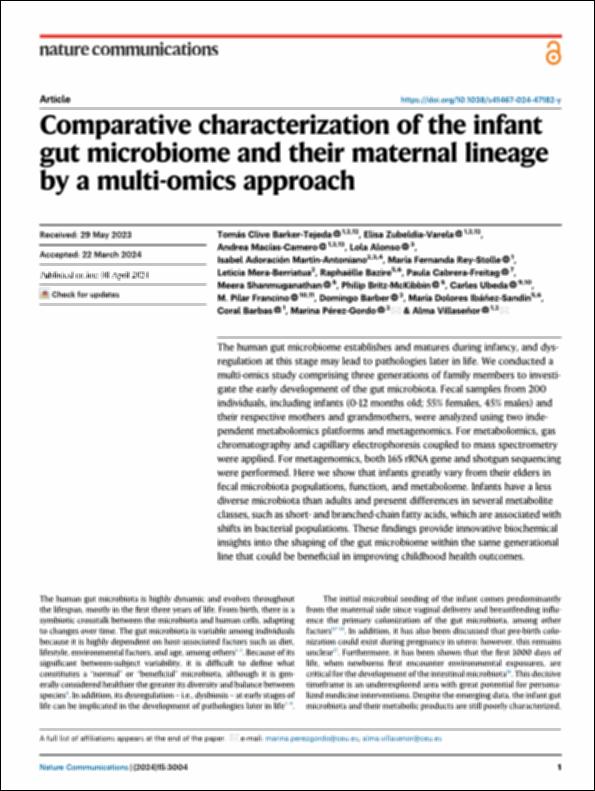Por favor, use este identificador para citar o enlazar este ítem:
http://hdl.handle.net/10637/15761Comparative characterization of the infant gut microbiome and their maternal lineage by a multi-omics approach
| Título : | Comparative characterization of the infant gut microbiome and their maternal lineage by a multi-omics approach |
| Autor : | Barker Tejeda, Tomas Clive Zubeldia Varela, Elisa Macías Camero, Andrea Alonso Guirado, Lola Martín Antoniano, Isabel Adoración Rey-Stolle, María Fernanda Mera Berriatua, Leticia Bazire, Raphaëlle Cabrera-Freitag, Paula Shanmuganatha, Meera Britz-McKibbin, Philip Ubeda, Carles Francino, María Pilar Barber Hernández, Domingo Ibáñez-Sandín, María Dolores Barbas Arribas, Coral. Pérez Gordo, Marina Villaseñor Solis, Alma Cristina |
| Materias: | Microbioma humano; Metabolomics |
| Editorial : | Nature Research |
| Citación : | Barker-Tejeda, T.C., Zubeldia-Varela, E., Macías-Camero, A. et al. Comparative characterization of the infant gut microbiome and their maternal lineage by a multi-omics approach. Nat Commun 15, 3004 (2024). https://doi.org/10.1038/s41467-024-47182-y |
| Resumen : | The human gut microbiome establishes and matures during infancy, and dysregulation at this stage may lead to pathologies later in life. We conducted a multi-omics study comprising three generations of family members to investigate the early development of the gut microbiota. Fecal samples from 200 individuals, including infants (0-12 months old; 55% females, 45% males) and their respective mothers and grandmothers, were analyzed using two independent metabolomics platforms and metagenomics. For metabolomics, gas chromatography and capillary electrophoresis coupled to mass spectrometry were applied. For metagenomics, both 16S rRNA gene and shotgun sequencing were performed. Here we show that infants greatly vary from their elders in fecal microbiota populations, function, and metabolome. Infants have a less diverse microbiota than adults and present differences in several metabolite classes, such as short- and branched-chain fatty acids, which are associated with shifts in bacterial populations. These findings provide innovative biochemical insights into the shaping of the gut microbiome within the same generational line that could be beneficial in improving childhood health outcomes. |
| URI : | http://hdl.handle.net/10637/15761 |
| Derechos: | http://creativecommons.org/licenses/by-nc-nd/4.0/deed.es Open Access |
| ISSN : | 2041-1723 |
| Fecha de publicación : | 8-abr-2024 |
| Centro : | Universidad San Pablo-CEU |
| Aparece en las colecciones: | Medicina |
Los ítems de DSpace están protegidos por copyright, con todos los derechos reservados, a menos que se indique lo contrario.


